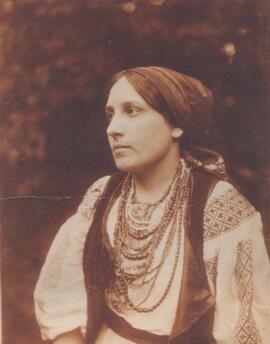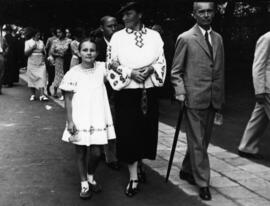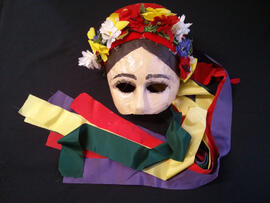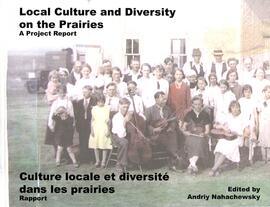The collection consists of three albums of photographs many of which were included in the historical and ethnographic albums "Ivan Honchar: Ukraine and Ukrainians".
Honchar, IvanCollection consists of four family histories researched and self-published by Gloria Rutherford: Yakemchuk family, Cherweniuk family, Bezmutko family, and Pluta family (Gloria's family on her mother's and father's sides). There are multiple newspaper clippings and family photographs enclosed in the books. Many of the photographs are signed at the back identifying people.
A local history book "A walk down memory lane" about Hufford, SK.
"My heritage from the builders of Canada" - a book by Olivia Rose Fry - Gloria's aunt, signed by the author on August 8, 1967: "To my dear niece Gloria and Phill Rutherford"
The collection consists of liturgical music, including Entrance and Recessional, Hymns in Honour of the Mother of God, Holy Spirit, Holy Eucharist, Various Saints, Tropars, Easter; and music scores and lyrics of Ukrainian folk songs (calendar cycle). It has been organized in three series: Folk music, Religious music, and Plast Song Books (self-published).
The goal of the “Saving Ukrainian Canadians’ Heritage” oral history project was to document stories of Ukrainian pioneers in the Prairie Provinces. The project was led by CYMK, and its digitization and revival are a collaboration between the Kule Folklore Centre and the Ukrainian Museum of Canada-Saskatoon. It consists of hundreds of hours of interviews conducted in Alberta, Saskatchewan, Manitoba and Ontario from 1971-1972. There are also 700 photographs: some historical, and others – from the time of the project.
"Under the federal government sponsored plan for student employment "Opportunities for Youth", the Canadian Ukrainian Youth Association is sponsoring project "S.U.C.H."- Save the Ukrainian Canadian Heritage. This Association, which may be briefly designated as "C.Y.M.K" is a nationally based youth organization founded in 1931. Its prime aim is to foster, promote and develop in the national life of Canada the finest cultural elements and traditions of the Ukrainian people. The national office of CYMK, located in Saskatoon, Saskatchewan, serves as an information bureau, a programme source, public relations office and an organizer of various workshops, conferences and conventions.
"Project SUCH is research oriented. The main objective is to record and collect information and artifacts of historical and ethnological significance from various Ukrainian communities across eastern and Western Canada. This will be primarily accomplished by recorded interviews with Ukrainian pioneers and through public meetings to turn the attention of local youth and adults to the precious nature of their heritage.
"Specifically, the research will be carried out by talking to pioneer settlers, recording folklore, songs, traditions and pioneer accounts of life in Canada, collecting books, records and accounts of historical interest from the Ukrainian community.
"Fifteen students will be doing field work in Ukrainian communities throughout Alberta, Saskatchewan and Ontario for the summer months, with an additional student coordinator in Saskatoon overseeing the entire project.
"The necessity for work of this nature has been evident for some time but lack of funds has impeded the realization to a great extent. This project as SUCH will provide and opportunity for our young students to make a valuable contribution to Canadian culture- to study the process of acculturation- preservation and adaptation of one's cultural heritage.
"As a result of this work various groups and agencies will benefit, e.g., universities, provincial tourist bureaus, Dominion and Provincial Archives and Museums, local Ukrainian community organizations and public libraries. It is therefore, sincerely hoped that the communities will welcome these young students and where necessary, provide assistance and support."
The Viter Ukrainian Folk Group Choir was a large group project, supported by KuFC equipment and logistics. Graduate students from the Fall 2014 Folklore Research Methods class (MLCS) taught by Andriy Nahachewsky attended a number of rehearsals and performances by the Viter Ukrainian Folk Choir of Edmonton. Students gained experience using recording equipment, conducting interviews and then published their findings. They produced two short videos documenting the choir on stage and as a community.
Students: Nataliya Bezborodova, Larisa Cheladyn, Kateryna Kod, Kelci Mohr, Deepak Paramashivan, Allison Sokil and Dana Wylie.
Aside from two films, there are many photographs in the collection.
This is a collection of folklore materials and family archives from Roman Onufrijchuk, a key leader in the 1970s and 1980s "Cultural Immersion Camps" organized by CYMK, which involved many future leaders of the Ukrainian community across Canada. This unique and large collection highlights one family's experience in Ukraine, in the Displaced Camps in Europe, and in Canada. The Onufrijchuk fonds includes family photographs, correspondence, souvenirs, publications and a large collection of embroideries.
Onufrijchuk, RomanMaryna Hrymych was part of the team of four scholars who went to Brazil in May 2009 together with Andriy Nahachewsky, Serge Cipko and John Lehr. The goal of this research trip was to explore history, daily life, cultural landscape and traditional culture of Ukrainians in Brazil. Ukrainians started immigrating to Brazil in the end of the 19th century and settled mostly in the states of Parana and Santa Catarina. After the trip, all four researchers donated their photographs to the Bohdan Medwidsky Ukrainian Folklore Archives.
Hrymych, MarynaThe Faculty Club Malanka collection features memorabilia from the annual Malanka that took place at the University of Alberta Faculty Club between January 13, 1973 and January 1993. Included in the collection are masks, programs and other ephemera related to the festivities. There are 20 masks worn by mummers for Malanka ’89. The masks were designed and created in December of 1988 by Meron Sembaliuk with the assistance of his father Paul Sembaliuk. Each mask was handmade, either with papier-mâché or from articles found around the home. Meron organized a group of his friends to take on the various characters associated with the event. Included were: Mark Ferbey (Malanka), Ihor Hlushok (Sun God), Vasyl Maluzynsky (Vasyl/soldier), Shannon Hohol (soldier), and Terry Taciuk (thief). Other characters included: a Bear, a Goat, a Gypsy, a Star, an Old Man, a Bird.
There is also a letter from Dr. Manoly Lupul addressed to the Faculty Club administration outlining menu requirements, plus program menus which were designed and printed by Larisa Sembaliuk Cheladyn. Decorations for the event included unique rushnyky (ritual towels) that were designed and created by Paul Sembaliuk with the assistance of his wife Pat Sembaliuk, and his children Larisa and her husband Mich, sons Philip, Meron, Yuri and youngest daughter Andrea. This collection has the rushnyk specifically worn by Roman Onufrijchuk, the master of ceremonies for Malanka ’77.
The first Malanka at the Faculty Club was hosted by Dr. Metro Gulutsan. In the years that followed MC’s were invited from within the Edmonton Ukrainian Community and beyond including: Roman Onufrijchuk and Myroslav Kohut.
Sembaliuk familyThe goal of the Local Culture and Diversity on the Prairies project was to document everyday life, ethno-cultural identity and regional variation among people of Ukrainian, French, German and English heritage. How did people from diverse backgrounds interact, adapt and become "prairie Canadians" in the first half of the twentieth century? What was the relationship between cultural inheritance and local community participation? How did they express their various identities on the local community level? The project was designed to generate a great deal of documentary information and primary resources for further research in many aspects of these people's lives.
The collection consists of some 800 hours of audio recordings documenting life in approximately 450 different locations on the Prairies and across Canada prior to 1939, as well as video recordings, photographs, documents, field notes and other material associated with the project.
Kule Folklore CentreThe collection consists of photographs of the event organized by the KuFC to celebrate Ukrainian Christmas in January 2019. The event was held at the Student Lounge at the Arts & Convocation Hall, University of Alberta, and was well attended by people from MLCS, Arts Centres and Institutes, and Ukrainian Canadian community. Traditional Ukrainian Christmas dishes were served and carols were sung by the participants.
Kule Folklore CentreThis collection consists of audio recordings and photographs. Recordings include news/talk shows, interviews conducted for CEESSA, and meetings and conference presentations from CEESSA. They cover diverse topics such as: problems in Central and Eastern European studies at the time and how universities and their departments function, immigration, politics, languages, daily life, life on the Canadian Prairies, life in Canada during WWII, CEESSA’s organization, goals, and projects.
Central and East European Studies Society of AlbertaThe collection includes Yarema Kowalchuk's final essay for the course UKR-699.
Kowalchuk, YaremaThe collection consists of fieldwork materials and essays collected by Demjan Hohol for folklore courses.
Hohol, DuaneThe collection consists of organizational documents of the Verkhovyna ensemble, correspondence, photographs, concert programs, brochures, and press clippings.
Verkhovyna Vocal EnsembleThe collection consists of an interview with Ukrainian Canadian artist and iconographer Pavlo Lopata conducted by Maryna Chernyavska on October 25, 2017 at the Kule Folklore Centre, University of Alberta.
Lopata, PavloThis collection includes an essay written by Greg Robinson for the course Ukrainian 499.
Robinson, GregThe collection consists of songs and verses collected in Edmonton from the informants Joe Olinyk, Anna Olinyk, Mrs. Helena Pinkyj, Mrs. Eva Kurylo, Mrs. Maria Stratychuk, Mrs. Annie Kapach, and Mrs. Mary Lagoski, some of whom grew up in Galicia or Bukovina and immigrated to Canada.
Kalmantovich, PhyllisThe collection consists of posters, programs, brochures, periodical publications related to various events and organizations in the Ukrainian Canadian community in Edmonton. Collected by Roman Soltykewych and Orest Soltykevych. The collection is organized into the following series:
- Plast Functions 1956 -1978
- Exhibits 1967 - 1974
- Taras Shevchenko Functions 1952 - 1980
- Religious Occasions (Christmas near end) 1951 - 1987
- Dancing Concerts 1960 - 1990
- Out-of-Towner's in Edmonton 1969 - 1990
- Political Functions (Jan. 22 near end) 1951 - 1979
- Ukrainian Festivals 1951 - 1979
- Ukrainian Cultural Functions 1962 - 1980
- Festivals with Ukrainians & Other Ethnic Groups 1961 - 1974
- CYMK 1956 - 1981
- Concerts out of Edmonton by non-Edmontonians 1961 - 1976
- Live Ukrainian Theatre 1964 - 1977
- Phonograph recordings
- Portraits
- Maps
The collection consists of interviews conducted by Nadya Foty in Alberta and Saskatchewan with 21 individuals from the Ukrainian community. The goal of the interviews was to collect and preserve information about Ukrainian culture with a focus on rites of passage.
The respondents included: George Hill, Jack Kindrake, Eugene and Katherine Yereniuk, Fedir Moroz, William Piasecky, Anna Zuzak, Jenny Palamaruk, Josie Talpash, Mary Stokalko, Anna Papish, Mary Sochaski, Mary Sturby, Bella Dobni, George Wizniuk, N. Wizniuk, William Kissel, Rosie Kissel, .
The collection consists of three photographs from the unveiling of Kule Theatre at Grant MacEwan University event.



